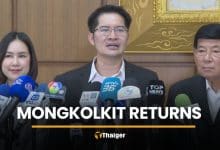How Nigeria arrested secessionist leader Nnamdi Kanu

Nnamdi Kanu, the leader of a group that has called for the independence of Biafra from Nigeria, was presented before a federal high court in Abuja on Tuesday, days after his arrest at an undisclosed location.
“Nnamdi Kanu has been intercepted. … He has been brought back to Nigeria in order to continue facing trial after disappearing,” said Justice Minister Abubakar Malami, referring to the fact that Kanu had not been seen in Nigeria since he was released on bail in 2017.
Kanu’s outlawed movement, the Indigenous People of Biafra (IPOB), which agitates for a separate state for ethnic Igbos in southeast Nigeria, has been labeled a terrorist organization by the Nigerian government.
One of Kanu’s lawyers, Nnemeka Ojeifor, described Kanu’s arraignment in court without the presence of his legal representative as “against the administration of criminal justices act.”
“If they want justice, they know Nmandi Kanu has lawyers. I am one of the lawyers. Why was he brought to court without informing us? How can they arraign him without telling his lawyers? This is totally unacceptable, unconstitutional,” Ojeifor told DW.
Secrecy surrounds Kanu’s arrest
Justice Minister Malami said 53-year-old Kanu was arrested on Sunday but gave no details about the location.
Local Nigerian media speculated that the leader of the Biafran pro-independence group was arrested in the Netherlands while on transit to Ukraine.
The online Nigerian news website The Will claimed, however, that Kanu was nabbed in Ethiopia with the help of the international policing body Interpol.
The website did not name its source and also did not say how Nigerian authorities learned about Kanu’s alleged presence in Ethiopia.
In a 2015 telephone interview with DW, Kanu said he was in Israel and that he had managed to flee Nigeria with help from friends in Israel.
Agitation for independent state called Biafra
The push for an independent Biafra has a long history in Nigeria.
In 1967, the calls of Igbo leaders for a separate state led to a brutal two-and-half year civil war. A siege by Nigeria’s federal troops on Igbo lands lead to the death of estimated 1 million people, mainly due to starvation, famine and disease.
Kanu, who was born in 1967 in the war era, later took up the cause of an independent state for Igbo people, founding the Indigenous People of Biafra in 2014.
He was subsequently arrested on 14 October 2015 and slapped with 11 charges, including terrorism and treasonable felony.
He disappeared while on bail.
In 2020, IPOB established an armed wing, the Eastern Security Network (ESN), which has been blamed for a number of violent attacks on police stations, electoral offices and other federal properties in southeast Nigeria.
Around 130 police and security officials have been killed and some 20 police stations were attacked this year, according to local media tallies.
Abdul Azeez Sulaiman, representing the Coalition of Northern Group, a non-governmental organization campaigning for the interest of northerners in the southeast, told DW that IPOB’s independence aspirations has significant impact on ethnic non-Igbo Nigerians living in the country’s southeast.
“We are calling on federal authorities, the federal prosecutors to include charges of incitements to violence, that involved violent killings and attacks on people of non-Igbo ethnicity living in the southeast and other places,” said Sulaiman.
Biafra campaign goes online
The secessionists have been carrying out massive online campaigns, publishing and distributing tweets and Facebook posts via an army of online activists.
President Muhammadu Buhari vowed to crush IPOB in a recent tweet, which the platform subsequently deleted for breach of its policy.
In the deleted tweet, Buhari compared the civil war, in which he fought on behalf of the federal government, to recent attacks on offices of the national electoral commission. He threatened to “treat” those who vandalized the electoral offices “in the language they understand.”
“Many of those misbehaving today are too young to be aware of the destruction and loss of lives that occurred during the Nigerian Civil War,” Buhari’s tweet read.
Nigeria’s government has since banned Twitter and also said that social media companies wishing to operate in Nigeria must register as a local entity and be licensed.
It has denied that the Twitter ban had anything to do with the deleted presidential tweet.
Information Minister Lai Mohammed cited Kanu’s posts as a factor in the government’s decision to suspend Twitter.
Divided opinions
The name Nmandi Kanu is as controversial as his mission which deeply divides opinions in Nigeria. His rearrest has sparked a heated debate among different segments of Nigeria’s population.
According to security analyst Kabiru Adamu, transparency on the part of the Nigerian government will be key in dealing with how the public react to Kanu’s trial.
“Law enforcement and judicial bodies will need to collaborate in terms of putting forward clear and convincing evidences of [Kanu’s] culpability in all the things he is being accused of and a transparent judicial process be pursued so that he is tried in a manner that will convince anyone that there is no political interference in the trial,” Adamu told DW.
Ubale Musa in Abuja contributed to this report.
SOURCE: DW News
Latest Thailand News
Follow The Thaiger on Google News:


























